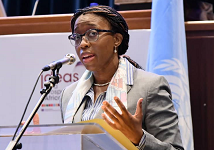Organized by the United Nations Economic Commission for Africa (UNECA) the 53rd session of the Conference of African Ministers of Finance and Development opens today in Addis Ababa, Ethiopia.
The conference aimed at sharing ideas on how African economy dealt with the COVID-19 pandemic and recovery strategies. Opening the conference Prime Minister of Ethiopia Abiy Ahmed said: “COVID-19 came to test our readiness and our resilience. From the crisis we have not only demonstrated Africa’s readiness to confront challenges but also Africa’s steadfast commitment to focusing on growth through innovation.”
“…In this disruption-prone world, each one of us must get at least three crucial agenda items right: the digital transformation, the climate economy, an institutional framework for implementation and accountability,” Abiy said.
In her presentation Vera Songwe, head of UNECA stated that COVID-19 has increased the number of poor people in Africa. “ECA estimates that between 49 million–161 million Africans have fallen into poverty due to COVID-19, with an estimated 100 million as the most likely scenario,” she said.
She also mentioned that social assistance spending in Africa is far less that of other regions.
“On per-capita basis, the 30 countries in Africa, for which data is available, spend only $10 per capita on social protection, against $361 per capita in East Asia and the Pacific and USD 442 per capita in North America,” she said.
Africa should focus stimulus to cushion the impact of Covid-19, revitalize its economy and stop importing unnecessary things, according to Ken Ofori-Atta, Minister-Designate for Finance of Ghana, who noted that Africa’s food import bill of $35 billion is estimated to rise to $110 billion by 2025. “Africa has a documented history of outsourcing much of its industrial capacity, and have lost the required capability to sufficiently produce its own food. COVID-19 taught us the need to build internal resilience. When push came to shove, our industries stepped up to produce
PPEs, Sanitizers, ventilators, among others. This proves that Africa can develop its industrial hub,” he said.
He further stated that African countries need to leverage the African Continental Free Trade Area (AFCFTA) to accelerate industrialization, a prerequisite for job creation. “The pandemic has taught us that our economic prospects hinge on expanding regional value chains to support Africa’s manufacturing and job creation. The AfCFTA, headquartered in Accra, is the largest trade block by country participation, which brings together 55 African countries with a combined population of about 1.3 billion and a combined GDP of more than $2.6 trillion. AfCFTA can consolidate this African market by making it easier for businesses to reach more economies of scale, promote regional value chains and lower the cross border costs of trading for enterprises, companies and consumers.”
The UNECA projects that the sole removal of tariffs on goods, could increase the value of intra-African trade from 15% (approx. $50 billion) to 25% (approx. $70 billion) by 2040. The AfCFTA could also boost Africa’s income by $450 billion by 2035.

